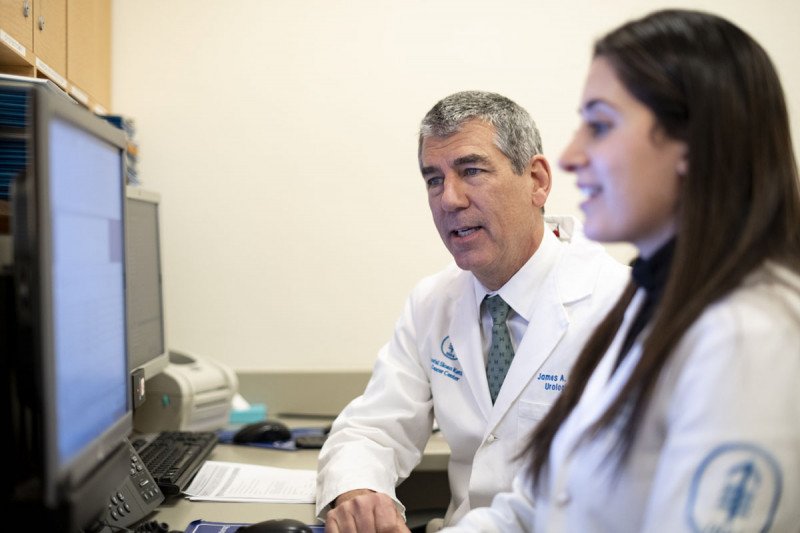
For cancer that grows slowly, it can take a while for doctors to establish the benefits of a new treatment approach. That certainly seems to be the case with prostate cancer treated with drugs before surgery.
Results from a clinical trial suggest that for some men with prostate cancer, giving a two-drug combination before surgery can reduce the risk of the disease coming back (recurrence). But this effect does not become significant until after five or more years. The treatment approach may also increase overall survival, meaning the patient does not die from prostate cancer.
The finding was presented on May 5 at the annual meeting of the American Urological Association by James Eastham, a Memorial Sloan Kettering prostate cancer expert.
The phase III trial investigated men whose cancer appeared to be confined to the prostate but, because of certain clinical features, was deemed at a high risk of recurrence with surgery alone. This accounts for 15 to 20% of people who are newly diagnosed with prostate cancer.
“This is a potentially practice-changing finding for treating these men,” says Dr. Eastham, Chief of MSK’s Urology Service. “Surgery is often not adequate for this high-risk group, so there has been a search for better strategies.”
One standard therapy is removal of the prostate, called a radical prostatectomy. But this is often not enough to keep the cancer from returning in people with high-risk prostate cancer.
Giving drugs before surgery is called neoadjuvant therapy. It is a common treatment strategy for many cancers and often improves the results. This is likely because the drugs shrink the tumor, making it easier to remove completely, or because the drugs kill off any stray cancer cells that may remain in the body. Over the last two decades, doctors have tried neoadjuvant therapy with prostate cancer, giving a treatment called hormone therapy, but it did not seem to help in combination with surgery.
The trial tested a different neoadjuvant therapy: A combination of hormone therapy and chemotherapy was given before a radical prostatectomy. In the study, 788 men were randomly split into two groups. One group had this combination of neoadjuvant therapy plus surgery. The other had just surgery.
The trial was designed to see if people who had the drug combination would have less disease recurrence. Recurrence is measured by progression-free survival (PFS). It counts the time that the cancer remains under control without getting worse. In the study, PFS was measured by the level of prostate-specific antigen, a protein produced by the prostate gland.
Emerging Payoff
At the three-year mark, there was no significant difference in how the two groups fared. But after a longer period, the benefit of giving drugs before surgery became clear. At the five-year mark, men who received the drug combination had a higher rate of PFS (78% versus 70%). The difference was even greater after eight years (74% versus 64%).
“If you look at the results over a long enough period, it’s apparent that this neoadjuvant therapy is making a difference in reducing risk,” Dr. Eastham says.
Early evidence suggests that receiving the drug combination also appears to increase the chances of overall survival. Because prostate cancer progresses slowly, Dr. Eastham explains, and men tend to live a long time after diagnosis, it will be a few more years before this benefit can be proven.
“Even with relatively short follow-up, there already appears to be a survival advantage, which is amazing,” he says. “We’re now examining the genetic makeup of the prostate tumors to see if we can better predict who will respond well to this treatment approach.”





